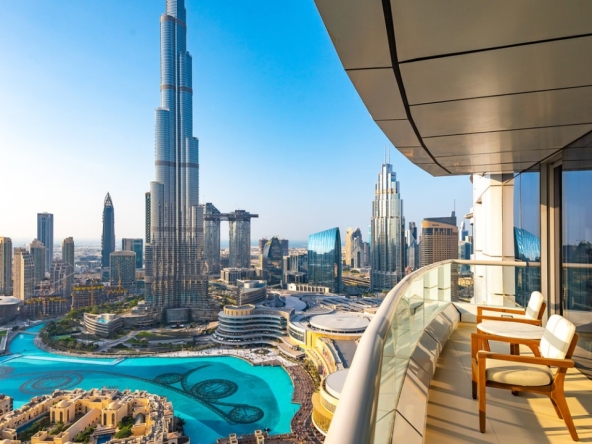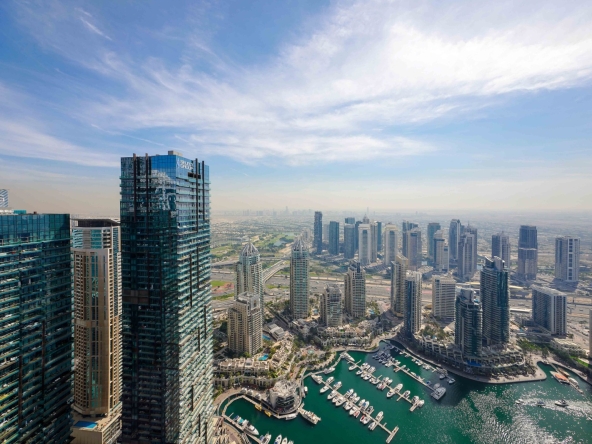Al Maktoum International Airport is not just a transportation hub; it’s a cornerstone for economic development, a catalyst for growth, and a symbol of Dubai’s ambition to be a global leader. The airport has brought about a plethora of opportunities for businesses, investors, and individuals alike. It has also played a pivotal role in shaping the economic landscape of Dubai and the United Arab Emirates (UAE) as a whole. This guide aims to provide a holistic view of the airport’s economic impact, covering everything from direct benefits like job creation to indirect advantages such as boosting the real estate market. Let’s embark on this enlightening journey to understand the economic powerhouse that is Al Maktoum International Airport.
The Economic Impact of Al Maktoum International Airport on the Surrounding Area
Al Maktoum International Airport is more than just a hub for travelers; it’s a cornerstone for economic development in the surrounding area. Since its inception, the airport has been a catalyst for growth, bringing in a plethora of opportunities for both businesses and individuals. The airport has significantly contributed to the Gross Domestic Product (GDP) of Dubai and the UAE. It has also attracted a considerable amount of foreign direct investment (FDI), thereby boosting the economic prospects of the region. The airport serves as a vital link for trade and commerce, connecting Dubai with key markets around the world.
Historical Background of Al Maktoum International Airport
Understanding the economic impact of Al Maktoum International Airport requires a look back at its history. Established as part of Dubai’s ambitious vision to become a global leader, the airport was more than just a construction project; it was a statement of intent. The airport was conceived as a part of the Dubai World Central, a planned residential, commercial, and logistics complex. The project was aimed at diversifying Dubai’s economy, reducing its dependence on oil revenues, and establishing it as a global aviation hub.

The airport was named after Sheikh Maktoum bin Rashid Al Maktoum, the former ruler of Dubai, to honor his contributions to the development of the emirate. Since its inauguration, the airport has undergone several phases of expansion, each aimed at increasing its capacity and adding new facilities. These expansions were not just about accommodating more passengers; they were strategic moves to attract more airlines, boost tourism, and facilitate trade. The airport’s history is a testament to Dubai’s forward-thinking approach and its commitment to economic development.
Strategic Importance of the Airport’s Location
Located strategically between the East and the West, Al Maktoum International Airport serves as a critical junction for global trade routes. This strategic positioning has made it an attractive location for businesses and has significantly contributed to the economic development of the surrounding area. The airport’s location near Jebel Ali Port, one of the world’s largest container ports, provides a seamless connection between air and sea transport, making it an ideal choice for logistics companies. Additionally, its proximity to key markets in Asia, Europe, and Africa offers businesses a competitive advantage in terms of reduced shipping times and costs. The airport also benefits from Dubai’s status as a free trade zone, offering tax incentives and simplified customs procedures, thereby attracting businesses from various sectors.
Boost in Tourism
Tourism is the lifeblood of Dubai, and Al Maktoum International Airport has played a pivotal role in attracting visitors. The airport’s state-of-the-art facilities, including luxurious lounges, duty-free shopping, and world-class dining options, have made it a preferred choice for travelers. Its seamless connectivity to major tourist attractions in Dubai and the UAE has also been a significant draw. The boost in tourism has had a ripple effect on various sectors, including hospitality, retail, and entertainment. Hotels, restaurants, and tourist attractions in the vicinity have seen increased footfall and revenue. The tourism revenue generated has not only enriched local businesses but also contributed to government coffers through taxes and fees.
Trade and Commerce
Al Maktoum International Airport serves as a vital hub for importing and exporting goods. Its strategic location and world-class facilities have attracted businesses from around the globe, making it a bustling center for trade and commerce. The airport’s cargo terminals are equipped with the latest technology, ensuring efficient handling and quick turnaround times for goods. This efficiency is crucial for industries that rely on timely deliveries, such as perishable goods and e-commerce. The airport also benefits from Dubai’s free trade agreements and tax incentives, making it an attractive option for international traders. Furthermore, its proximity to Jebel Ali Port allows for seamless multi-modal logistics solutions, combining air and sea transport. This has made the airport a preferred choice for global logistics companies, further boosting its role in international trade
Real Estate Development
The presence of Al Maktoum International Airport has led to a surge in real estate development in the surrounding areas. From luxury hotels to residential complexes, the real estate market has seen a significant uptick, providing lucrative investment opportunities. The airport’s expansion plans have acted as a catalyst for property developers to invest in new projects, anticipating future demand. These developments are not limited to residential properties; commercial spaces like office buildings and retail centers have also proliferated. The rise in property values has benefited local homeowners and attracted real estate investors from around the world. Moreover, the development of real estate has led to additional job creation in construction, property management, and related services. The growth in real estate has also increased the tax base, providing more revenue for local governments to invest in public services and infrastructure.
Infrastructure Growth
The construction of Al Maktoum International Airport necessitated the development of surrounding infrastructure. Roads, public transport, and utilities have seen major upgrades, contributing to the overall economic growth of the region. The government has invested heavily in connecting the airport to key areas of Dubai through highways and metro lines. These infrastructure projects have not only made the airport more accessible but have also facilitated the movement of goods and people in the surrounding areas. Improved infrastructure attracts businesses and residents alike, creating a virtuous cycle of economic growth. Furthermore, the construction and maintenance of these infrastructure projects have generated additional jobs and contracts for local companies. In essence, the airport has been a key driver in upgrading the region’s infrastructure, which in turn has had a multiplier effect on the economy.

Educational Institutions
With the influx of people and businesses, there has been a growing demand for educational institutions. Several schools, colleges, and training centers have sprung up in the vicinity, adding another layer to the area’s economic fabric. The availability of quality educational institutions attracts families to settle in the area, further boosting the real estate market and local businesses. These institutions also provide employment opportunities for educators and administrative staff. Moreover, they play a role in workforce development, offering courses and training programs that align with the needs of industries prevalent in the area, such as aviation, logistics, and hospitality. This ensures a steady supply of skilled workers, which in turn attracts more businesses to set up operations near the airport.
Foreign Direct Investment (FDI)
Al Maktoum International Airport has been a magnet for foreign direct investment (FDI). Its strategic location, robust infrastructure, and business-friendly policies make it an attractive proposition for international investors. The airport is situated within the Dubai World Central, a free economic zone offering various incentives such as tax exemptions, 100% foreign ownership, and simplified customs procedures. These incentives have lured multinational corporations to set up their regional headquarters and logistics centers in the vicinity. The influx of FDI has not only boosted the local economy but also facilitated technology transfer and skill development. It has also increased competition among local businesses, encouraging them to innovate and improve their offerings. The FDI attracted by the airport has had a cascading effect on the economy, creating jobs, boosting consumer spending, and generating tax revenue for the government. In essence, the airport serves as a beacon for foreign investors, amplifying its economic impact on the surrounding area.

Local Investments
Not just foreign investors, but local businesses have also ramped up their investments in the area, further bolstering the economic landscape. The airport’s growth prospects have encouraged local entrepreneurs to invest in various sectors, from hospitality and retail to services and manufacturing. These investments have led to business diversification, reducing the area’s economic dependency on any single industry. The rise in local investments has also created a supportive ecosystem for small and medium-sized enterprises (SMEs), offering them a range of business opportunities from supplying goods to providing services. Local investments often lead to community development as entrepreneurs are more likely to reinvest their profits in local projects and philanthropic activities. In summary, the airport’s allure is not limited to foreign investors; it has also invigorated local investments, contributing to a well-rounded economic development.
Impact on Small Businesses
Small businesses have thrived due to the airport’s presence. From local shops to service providers, the economic ecosystem has been enriched, providing a fertile ground for small businesses to flourish. The increase in footfall due to travelers and employees working at the airport has boosted demand for local services like restaurants, cafes, and convenience stores. Additionally, the airport’s operations have created opportunities for small businesses to become part of the supply chain, providing goods and services ranging from catering to maintenance. The growth of small businesses is crucial for any economy as they are significant job creators and contribute to local GDP. They also add to the community’s vibrancy and diversity, making the area more attractive for residents and visitors alike. The airport has acted as a catalyst for small business growth, which is a cornerstone of economic development.
Environmental Considerations
While the economic benefits of Al Maktoum International Airport are substantial, it’s crucial to consider its environmental impact as well. Airports are often associated with high levels of carbon emissions and noise pollution. However, Al Maktoum International Airport has taken proactive steps to mitigate these concerns. The airport has implemented various sustainability initiatives, such as energy-efficient lighting, waste management programs, and water conservation measures. These initiatives not only reduce the airport’s environmental footprint but also make economic sense in the long run by lowering operational costs. Moreover, the airport is exploring the use of renewable energy sources and aims to become a leader in sustainable aviation. The focus on environmental sustainability attracts eco-conscious businesses and travelers, adding another dimension to the airport’s economic impact. In summary, while the airport is an economic powerhouse, it is also setting benchmarks in environmental sustainability, ensuring that economic growth does not come at the expense of environmental degradation.
FAQs
-How does Al Maktoum International Airport contribute to Dubai’s economy?
-Al Maktoum International Airport is a significant contributor to Dubai’s economy. It has generated thousands of jobs, boosted tourism, and attracted both local and foreign investments. The airport serves as a vital link for trade and commerce, enhancing Dubai’s position as a global business hub. Its impact is not just limited to direct economic benefits; it has also led to the growth of various sectors like real estate, education, and small businesses in the surrounding area.
-What are the future expansion plans for the airport?
-The airport has ambitious expansion plans aimed at increasing its passenger and cargo capacity. These plans include the construction of new terminals, runways, and additional facilities. The expansion is expected to further boost the airport’s economic impact by creating more jobs and attracting more businesses.
-Are there any sustainability initiatives at the airport?
-Yes, the airport has implemented several sustainability initiatives, including energy-efficient lighting, waste management, and water conservation measures. These initiatives aim to reduce the airport’s environmental impact while also making economic sense by lowering operational costs.
-How does the airport impact small businesses?
-The airport has had a positive impact on small businesses in the surrounding area. The increase in footfall due to travelers and employees has boosted demand for local services like restaurants, cafes, and shops. Small businesses have also become part of the airport’s supply chain, providing various goods and services.
-What role does the airport play in attracting foreign direct investment?
-The airport’s strategic location and business-friendly policies have made it a magnet for foreign direct investment. It offers various incentives such as tax exemptions and simplified customs procedures, attracting multinational corporations to set up their operations in the vicinity.
-How does the airport affect the real estate market?
-The airport has led to a surge in real estate development in the surrounding areas. From residential complexes to commercial spaces, the real estate market has seen significant growth, providing lucrative investment opportunities and boosting property values.
The economic impact of Al Maktoum International Airport on the surrounding area is both direct and far-reaching. From creating jobs and boosting tourism to attracting both local and foreign investments, the airport is a cornerstone for economic development. Its influence extends beyond the immediate vicinity, shaping the economic landscape of Dubai and the UAE as a whole. As the airport continues to expand and evolve, its role as an economic catalyst will only become more significant. For investors and locals alike, understanding this impact is crucial for making informed decisions. With its focus on sustainability, Al Maktoum International Airport is setting new benchmarks, ensuring that economic development is balanced with environmental conservation.



